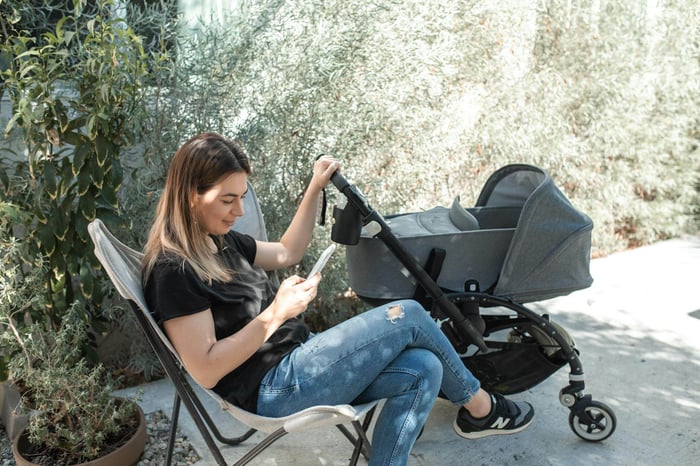Becoming a new mom changes everything. Suddenly, your time, your body, your emotions—your entire existence—are intertwined with this tiny human who depends on you for everything. And while the love is overwhelming and beautiful, so is the exhaustion.
One of the biggest challenges postpartum moms face is feeling like they have to be everything for everyone—caring for the baby, entertaining visitors, keeping up with household responsibilities, and somehow still being "themselves." The reality? That’s not sustainable.
Boundaries aren’t just important in postpartum—they’re essential. They protect your energy, safeguard your mental health, and help create the space you need to heal and bond with your baby. But setting boundaries can feel uncomfortable, especially if you're used to prioritizing others.
Why Setting Boundaries as a New Mom is Hard (But Necessary)
For many women, boundaries weren’t something we were raised to feel comfortable with. We were taught to be accommodating, to say yes when asked for help, and to be available—especially to family. But postpartum is a time when boundaries are absolutely non-negotiable.
Here’s why:
- Your body is healing. Whether you had a vaginal birth or a C-section, your body just went through a massive event. You need time to physically recover without the pressure of hosting guests or meeting other people’s expectations.
- Your nervous system is fragile. Hormones are fluctuating, sleep deprivation is real, and your emotions might be all over the place. Overcommitting or allowing too much outside influence can make this period even harder.
- You and your baby are adjusting to each other. The postpartum period is sometimes called the "fourth trimester" because it’s a crucial time for bonding. Too many interruptions—whether from well-meaning visitors or unrealistic demands—can disrupt that connection.
- You deserve support, not stress. This is not the time to be managing other people’s feelings. If someone is upset because they can’t visit immediately or because you’re saying no to certain traditions, that is not your burden to carry.
Boundaries Every New Mom Needs
Here are some key areas where boundaries can make all the difference:
1. Visitors & Social Expectations
Everyone is excited to meet the baby, but that doesn’t mean they have automatic access to your home or your time.
Boundary to set: "We’re taking the first few weeks to rest and adjust as a family. We’ll let you know when we’re ready for visitors."
If you do want visitors, set clear expectations:
- No surprise drop-ins.
- No kissing the baby (because newborn immune systems are fragile!).
- If you visit, bring food, not just advice.
- Keep visits short and respect the mom’s need to rest.
2. Sleep & Rest
You are not obligated to stay up late to entertain guests or push through exhaustion just to prove you’re managing everything well.
Boundary to set: "Right now, my priority is resting when I can. I won’t be responding to messages or calls immediately."
Let people know that your rest comes first. If necessary, put your phone on Do Not Disturb.
3. Breastfeeding & Body Autonomy
If you’re breastfeeding, you may feel pressure to cover up, feed in a separate room, or avoid talking about your struggles, especially in the beginning. You don’t have to accommodate others’ discomfort.
Boundary to set: "I will feed my baby whenever and wherever I need to. If that makes you uncomfortable, you are welcome to step away."
If formula-feeding, you might get unwanted opinions. You can shut them down with: "We’re feeding in the way that works best for our family."
4. Advice Overload
Everyone (especially older generations) will have opinions on how you should parent. Some advice is helpful. Some is outdated. Some is downright intrusive.
Boundary to set: "I appreciate your concern, but we are doing what works for us."
Or, if someone is particularly pushy: "We’re following our doctor’s advice, and we feel good about our choices."
5. Household Responsibilities
You do not have to "bounce back" or keep up with household duties while healing and adjusting to being a new mom.
Boundary to set: "I won’t be taking on extra responsibilities right now. If you’d like to help, here’s what would be useful."
Let people contribute! If someone asks what you need, be specific: "We’d love a meal," or "It would be so helpful if you could pick up some groceries."
6. Protecting Your Mental Health
If someone—whether it’s a friend, family member, or even your partner—is draining your energy or making you feel unsupported, it’s okay to limit your interactions.
Boundary to set: "Right now, I need to focus on my well-being. I’ll reach out when I have the capacity to talk."
How to Set Boundaries Without Guilt
Let’s be honest—setting boundaries can feel uncomfortable, especially if you worry about disappointing people. But here’s the truth:
- Boundaries are not about being rude or selfish; they’re about self-preservation.
- The people who truly care about you will respect your needs.
- You do not owe anyone an explanation or justification for protecting your well-being.
- Boundaries will actually strengthen your relationships over time by preventing resentment and burnout.
If you feel guilty, remind yourself: You cannot pour from an empty cup. Protecting your energy now means you’ll have more to give in the long run—to your baby, your partner, and yourself.
Motherhood is beautiful, but it’s also intense. Setting boundaries in postpartum isn’t just a luxury—it’s a necessity. The more you protect your time, energy, and well-being, the better you’ll be able to navigate this new chapter.
If you’re struggling with setting boundaries or feeling the weight of resentment building, I created a program for moms like you. From Resentment to Resilience is designed to help moms reclaim their time, energy, and mental well-being while strengthening their relationships. Click here for more information.

.png)


